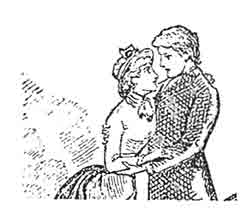Loudie MacAlshinder
Author: Archibald McIlroy
Date: 2010
Source: Ullans: The Magazine for Ulster-Scots, Nummer 11 Ware 2010

The following is an extract from The Auld Meetin’-Hoose Green by Archibald M‘Ilroy. Following the ‘kailyard’ tradition, it is only the dialogue that is in Ulster-Scots, while the connecting prose is mainly in standard English. However, M‘Ilroy’s writing is so natural and the Ulster-Scots so unforced that it is a gentle introduction to Ulster-Scots literature. For this reason, the Society’s Editorial Board is planning to produce a reprint of the full work in 2010, funding permitting. Readers will note the contrast between the speech of Jinsy and that of the police sergeant, who is clearly being portrayed as a speaker of Hiberno-English.
There was intense excitement “up through” on the evening on which Loudie MacAlshinder (Alexander) attempted to drown himself.
Loudie had only been married some two months; but already it was known that Jinsy and he were not “gettin’ on.”
He had, more than once, flung himself out of the house, after a domestic misunderstanding, threatening to “dae awa’ wi’ himsel’”; but as yet matters had never gone further than his strolling down the street the length of Johnnie Glenn’s, where he would stand for hours, propping up the gateway, and gloomily watching the traffic on the street; or slither into the smith’s shop, where he would, if not too sulky, put a charge of tobacco paper in his mouth, take a hand at the quivering big shaft of the bellows, and amuse himself by staring right into the centre of the white blaze.
On this occasion matters seemed to have taken a much more serious turn. A child came running up the back street, announcing that he had “seen Loudie up the meedas, near the ‘horse hole,’ wi’ his coat an’ hat aff, preparin’ tae jump in.”
Jinsy was frantic. The whole village ran, excepting the said small boy, who had been told off to acquaint the police. Jack Davison, who wore a stick leg, was in front of all.
Although Loudie had a clear ten minutes start, he did not appear to have commenced the serious business of drowning till he noticed the crowd approaching; then it was that he hurriedly flung off waistcoat and boots, and, to our horror (we were still a good way off), he plunged in!
Four people held Jinsy; the others quickened their pace. It appeared as if Loudie had missed his calculations at the last moment, and had escaped the “horse hole” after all. The place in which he was struggling did not contain more than three feet of water: his head was still high and dry.
“Oh, Loudie! Loudie! my ain man, come oot — oh, come oot!” screeched Jinsy. “Oh, nibers, let me dee alang wi’ ’im! Oh, my ain Loudie! come oot, an’ a’ll niver vex ye mair — indeed a’ll no’ — nor niver say a bad word aboot ye’r mother again!”
The villagers were less agitated now, for death seemed yet a long way off. In our opinion Loudie was ashamed to get up, for the water would hardly have reached to his knees.
“Come out o’ that, ye great hulkin’, cowardly brute!” roared the Sergeant. “Why don’t ye throw yersilf into the proper place, ye good-for-nothin’ scum o’ society? It’s the world that wud be well rid o’ ye, but ye haven’t the heart to drownd yersilf — nor wan o’ yer sort! Come out, wid yer standin’ there shiverin’ loike a duck in a thunder-storm” (Loudie by this time had gained his feet), “or be the powers, I’ll be afther splittin’ yer head wid me baton! Get off home wid ye now, an’ set yersilf about doin’ some honest work, for a change, instid o’ frightenin’ yer poor wife, an’ alarmin’ the neighbourhood; an’ if iver I catch ye at such a trick agen, oi’ll have ye clapped into jail for a month, jist to cool yersilf.”
We followed Loudie and Jinsy, in mute procession, back to the village, somewhat awed by the Sergeant’s unsympathetic remarks.
Jinsy hung on to her husband’s arm, wailing out between the sobs:
“Oh, Loudie, my ain Loudie, a’ll niver, niver vex ye again! Sure ye wudna’ leave me, ma ain dear man?”
“A’m ’feared, ye’r reverence,” said “Scobes” to Mr. McAllister, as he met him coming out from Loudie’s house later on in the evening — “a’m ’feared ye hae na stuck thir couple vera weel — they’r wantin’ sinnethery [asunder] sae sune. Cud the glue no’ a bin guid?”
“The glue was good, ‘Scobes,’” answered the minister, “but the timber was green.”
Next: Tha Nixt Tide
Previous: The Auld Meetin'-Hoose Green
Contents: Ullans: The Magazine for Ulster-Scots, Nummer 11 Ware 2010

